Organizational Behavior Essay: Personality Theories and Implications
VerifiedAdded on 2023/06/08
|9
|2284
|235
Essay
AI Summary
This essay delves into the realm of organizational behavior by analyzing diverse theoretical arguments concerning personality. It begins by defining personality and exploring various theories, including the Psychoanalytic Theory and Social Learning Theory, providing a foundation for understanding individual differences. The essay then examines major perspectives on personality, such as Psychoanalytic, Traits, Humanistic, and Social-Cognitive approaches, before delving into the arguments of personality. The essay also discusses the implications of personality differences for organizations, both positive and negative, and provides real-world examples. The Big Five personality traits are discussed in detail. The essay concludes by emphasizing the significance of personality theories in shaping organizational productivity and employee behavior, highlighting how these differences impact overall organizational effectiveness. The essay also presents the stages of personality development. The essay is well-structured, offering a comprehensive overview of personality's impact on organizational dynamics.
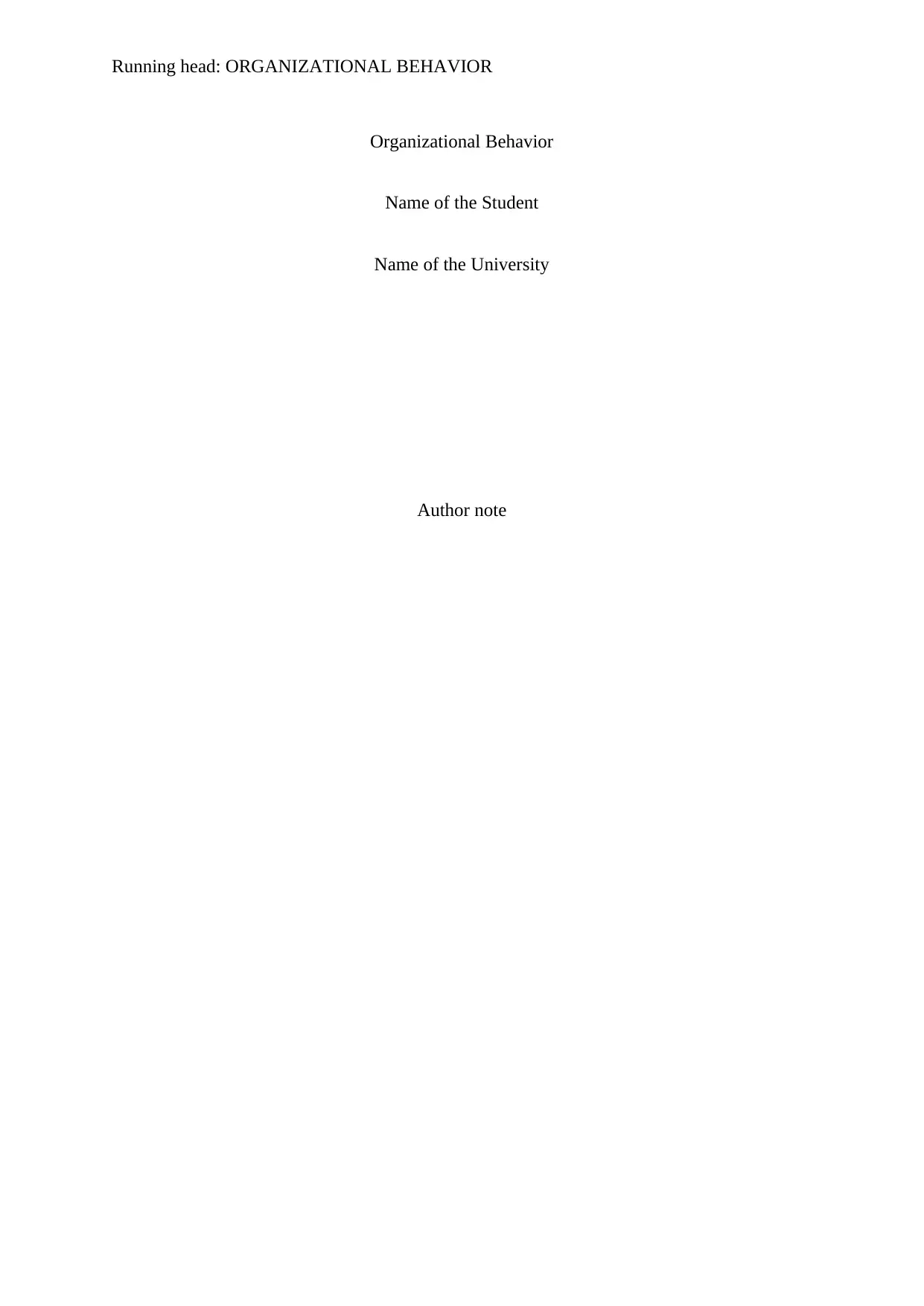
Running head: ORGANIZATIONAL BEHAVIOR
Organizational Behavior
Name of the Student
Name of the University
Author note
Organizational Behavior
Name of the Student
Name of the University
Author note
Paraphrase This Document
Need a fresh take? Get an instant paraphrase of this document with our AI Paraphraser
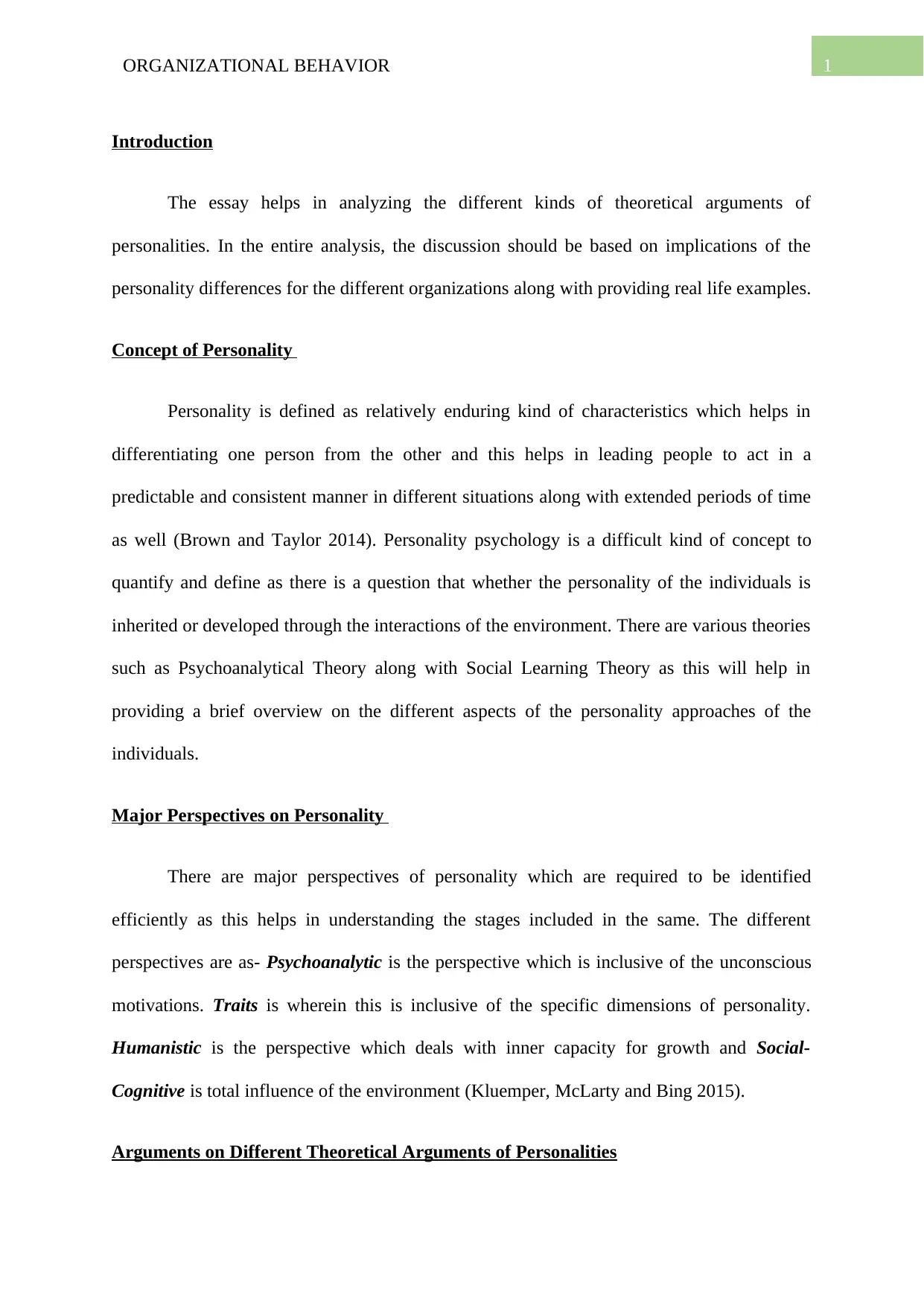
1ORGANIZATIONAL BEHAVIOR
Introduction
The essay helps in analyzing the different kinds of theoretical arguments of
personalities. In the entire analysis, the discussion should be based on implications of the
personality differences for the different organizations along with providing real life examples.
Concept of Personality
Personality is defined as relatively enduring kind of characteristics which helps in
differentiating one person from the other and this helps in leading people to act in a
predictable and consistent manner in different situations along with extended periods of time
as well (Brown and Taylor 2014). Personality psychology is a difficult kind of concept to
quantify and define as there is a question that whether the personality of the individuals is
inherited or developed through the interactions of the environment. There are various theories
such as Psychoanalytical Theory along with Social Learning Theory as this will help in
providing a brief overview on the different aspects of the personality approaches of the
individuals.
Major Perspectives on Personality
There are major perspectives of personality which are required to be identified
efficiently as this helps in understanding the stages included in the same. The different
perspectives are as- Psychoanalytic is the perspective which is inclusive of the unconscious
motivations. Traits is wherein this is inclusive of the specific dimensions of personality.
Humanistic is the perspective which deals with inner capacity for growth and Social-
Cognitive is total influence of the environment (Kluemper, McLarty and Bing 2015).
Arguments on Different Theoretical Arguments of Personalities
Introduction
The essay helps in analyzing the different kinds of theoretical arguments of
personalities. In the entire analysis, the discussion should be based on implications of the
personality differences for the different organizations along with providing real life examples.
Concept of Personality
Personality is defined as relatively enduring kind of characteristics which helps in
differentiating one person from the other and this helps in leading people to act in a
predictable and consistent manner in different situations along with extended periods of time
as well (Brown and Taylor 2014). Personality psychology is a difficult kind of concept to
quantify and define as there is a question that whether the personality of the individuals is
inherited or developed through the interactions of the environment. There are various theories
such as Psychoanalytical Theory along with Social Learning Theory as this will help in
providing a brief overview on the different aspects of the personality approaches of the
individuals.
Major Perspectives on Personality
There are major perspectives of personality which are required to be identified
efficiently as this helps in understanding the stages included in the same. The different
perspectives are as- Psychoanalytic is the perspective which is inclusive of the unconscious
motivations. Traits is wherein this is inclusive of the specific dimensions of personality.
Humanistic is the perspective which deals with inner capacity for growth and Social-
Cognitive is total influence of the environment (Kluemper, McLarty and Bing 2015).
Arguments on Different Theoretical Arguments of Personalities
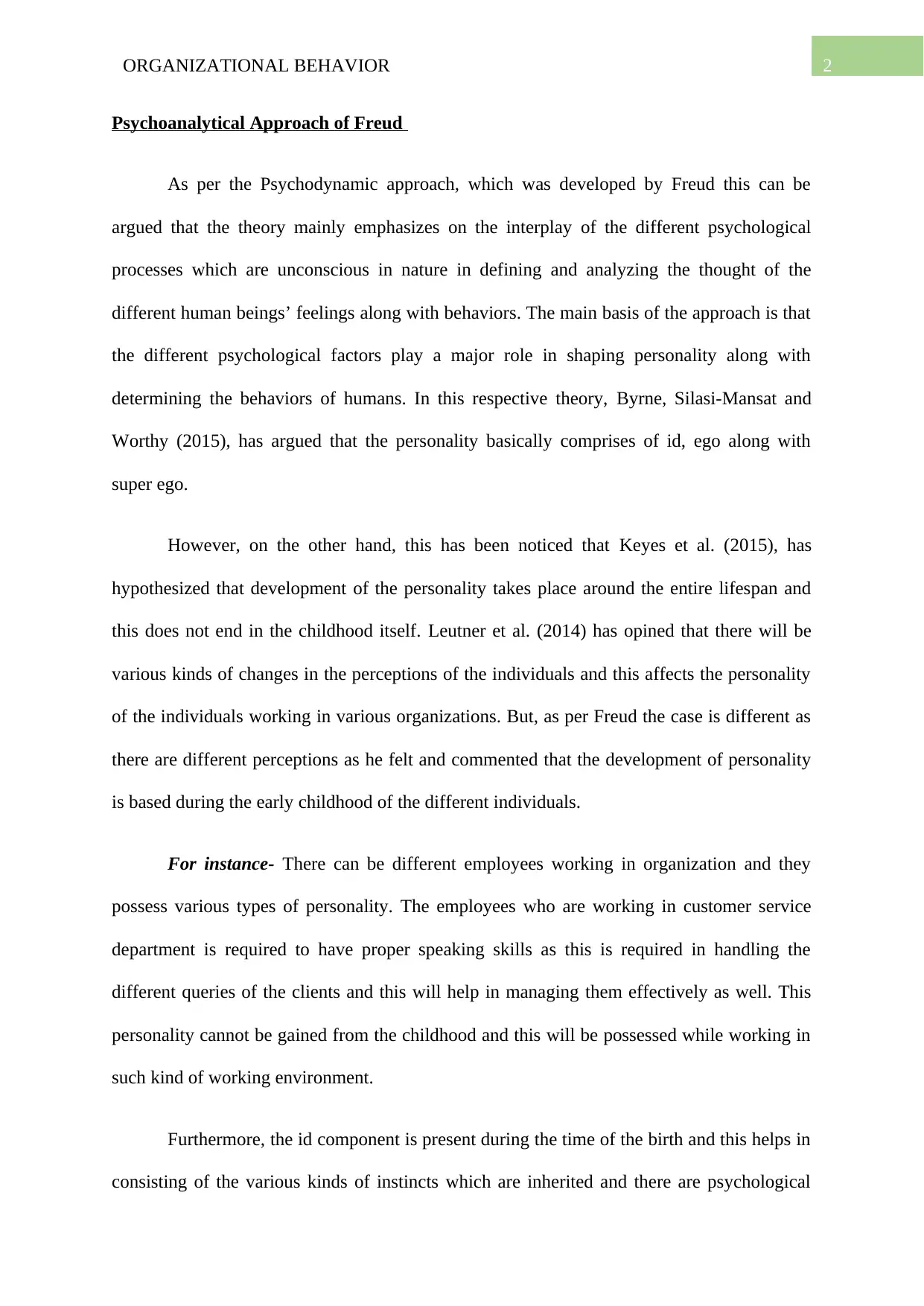
2ORGANIZATIONAL BEHAVIOR
Psychoanalytical Approach of Freud
As per the Psychodynamic approach, which was developed by Freud this can be
argued that the theory mainly emphasizes on the interplay of the different psychological
processes which are unconscious in nature in defining and analyzing the thought of the
different human beings’ feelings along with behaviors. The main basis of the approach is that
the different psychological factors play a major role in shaping personality along with
determining the behaviors of humans. In this respective theory, Byrne, Silasi-Mansat and
Worthy (2015), has argued that the personality basically comprises of id, ego along with
super ego.
However, on the other hand, this has been noticed that Keyes et al. (2015), has
hypothesized that development of the personality takes place around the entire lifespan and
this does not end in the childhood itself. Leutner et al. (2014) has opined that there will be
various kinds of changes in the perceptions of the individuals and this affects the personality
of the individuals working in various organizations. But, as per Freud the case is different as
there are different perceptions as he felt and commented that the development of personality
is based during the early childhood of the different individuals.
For instance- There can be different employees working in organization and they
possess various types of personality. The employees who are working in customer service
department is required to have proper speaking skills as this is required in handling the
different queries of the clients and this will help in managing them effectively as well. This
personality cannot be gained from the childhood and this will be possessed while working in
such kind of working environment.
Furthermore, the id component is present during the time of the birth and this helps in
consisting of the various kinds of instincts which are inherited and there are psychological
Psychoanalytical Approach of Freud
As per the Psychodynamic approach, which was developed by Freud this can be
argued that the theory mainly emphasizes on the interplay of the different psychological
processes which are unconscious in nature in defining and analyzing the thought of the
different human beings’ feelings along with behaviors. The main basis of the approach is that
the different psychological factors play a major role in shaping personality along with
determining the behaviors of humans. In this respective theory, Byrne, Silasi-Mansat and
Worthy (2015), has argued that the personality basically comprises of id, ego along with
super ego.
However, on the other hand, this has been noticed that Keyes et al. (2015), has
hypothesized that development of the personality takes place around the entire lifespan and
this does not end in the childhood itself. Leutner et al. (2014) has opined that there will be
various kinds of changes in the perceptions of the individuals and this affects the personality
of the individuals working in various organizations. But, as per Freud the case is different as
there are different perceptions as he felt and commented that the development of personality
is based during the early childhood of the different individuals.
For instance- There can be different employees working in organization and they
possess various types of personality. The employees who are working in customer service
department is required to have proper speaking skills as this is required in handling the
different queries of the clients and this will help in managing them effectively as well. This
personality cannot be gained from the childhood and this will be possessed while working in
such kind of working environment.
Furthermore, the id component is present during the time of the birth and this helps in
consisting of the various kinds of instincts which are inherited and there are psychological
⊘ This is a preview!⊘
Do you want full access?
Subscribe today to unlock all pages.

Trusted by 1+ million students worldwide
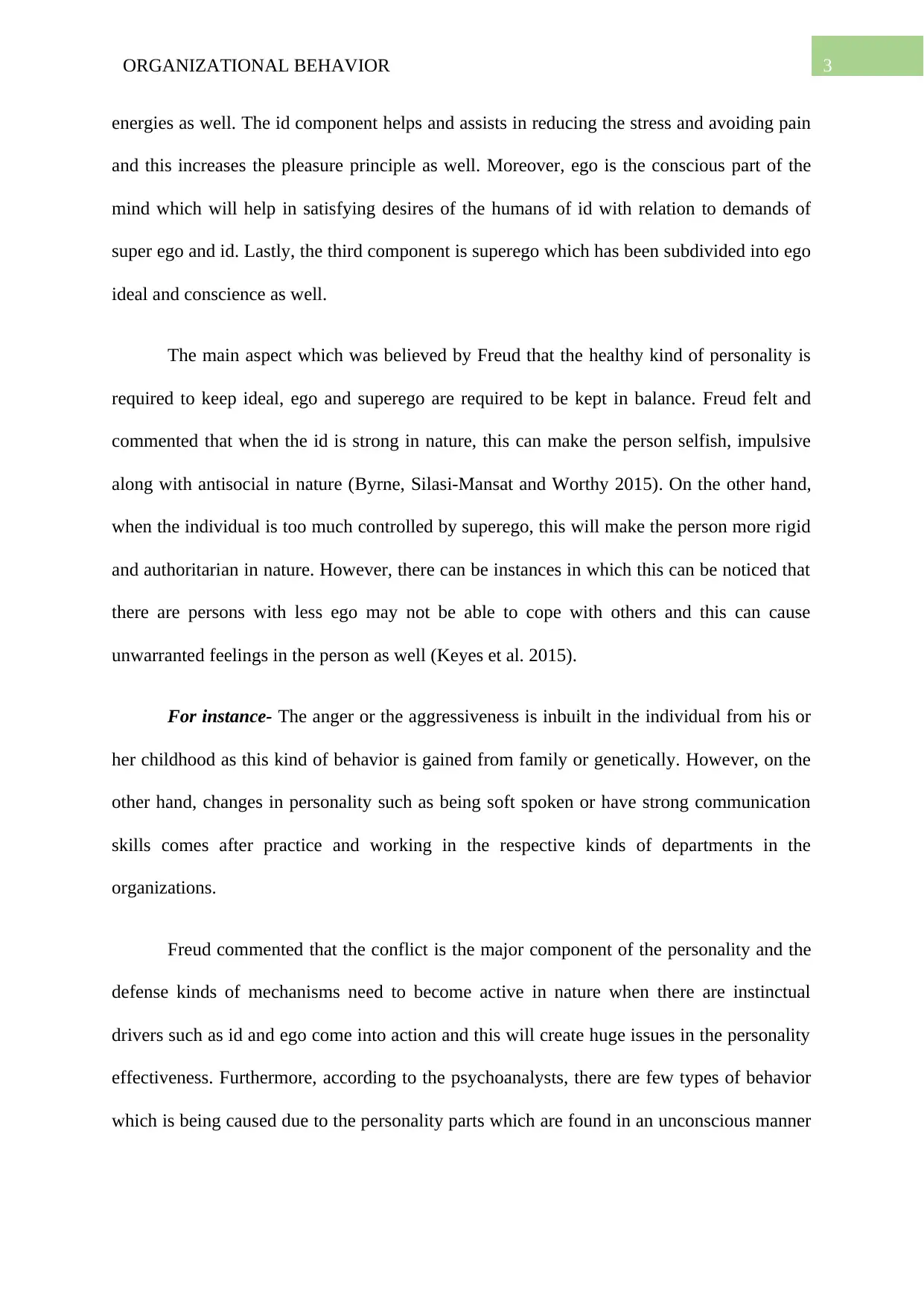
3ORGANIZATIONAL BEHAVIOR
energies as well. The id component helps and assists in reducing the stress and avoiding pain
and this increases the pleasure principle as well. Moreover, ego is the conscious part of the
mind which will help in satisfying desires of the humans of id with relation to demands of
super ego and id. Lastly, the third component is superego which has been subdivided into ego
ideal and conscience as well.
The main aspect which was believed by Freud that the healthy kind of personality is
required to keep ideal, ego and superego are required to be kept in balance. Freud felt and
commented that when the id is strong in nature, this can make the person selfish, impulsive
along with antisocial in nature (Byrne, Silasi-Mansat and Worthy 2015). On the other hand,
when the individual is too much controlled by superego, this will make the person more rigid
and authoritarian in nature. However, there can be instances in which this can be noticed that
there are persons with less ego may not be able to cope with others and this can cause
unwarranted feelings in the person as well (Keyes et al. 2015).
For instance- The anger or the aggressiveness is inbuilt in the individual from his or
her childhood as this kind of behavior is gained from family or genetically. However, on the
other hand, changes in personality such as being soft spoken or have strong communication
skills comes after practice and working in the respective kinds of departments in the
organizations.
Freud commented that the conflict is the major component of the personality and the
defense kinds of mechanisms need to become active in nature when there are instinctual
drivers such as id and ego come into action and this will create huge issues in the personality
effectiveness. Furthermore, according to the psychoanalysts, there are few types of behavior
which is being caused due to the personality parts which are found in an unconscious manner
energies as well. The id component helps and assists in reducing the stress and avoiding pain
and this increases the pleasure principle as well. Moreover, ego is the conscious part of the
mind which will help in satisfying desires of the humans of id with relation to demands of
super ego and id. Lastly, the third component is superego which has been subdivided into ego
ideal and conscience as well.
The main aspect which was believed by Freud that the healthy kind of personality is
required to keep ideal, ego and superego are required to be kept in balance. Freud felt and
commented that when the id is strong in nature, this can make the person selfish, impulsive
along with antisocial in nature (Byrne, Silasi-Mansat and Worthy 2015). On the other hand,
when the individual is too much controlled by superego, this will make the person more rigid
and authoritarian in nature. However, there can be instances in which this can be noticed that
there are persons with less ego may not be able to cope with others and this can cause
unwarranted feelings in the person as well (Keyes et al. 2015).
For instance- The anger or the aggressiveness is inbuilt in the individual from his or
her childhood as this kind of behavior is gained from family or genetically. However, on the
other hand, changes in personality such as being soft spoken or have strong communication
skills comes after practice and working in the respective kinds of departments in the
organizations.
Freud commented that the conflict is the major component of the personality and the
defense kinds of mechanisms need to become active in nature when there are instinctual
drivers such as id and ego come into action and this will create huge issues in the personality
effectiveness. Furthermore, according to the psychoanalysts, there are few types of behavior
which is being caused due to the personality parts which are found in an unconscious manner
Paraphrase This Document
Need a fresh take? Get an instant paraphrase of this document with our AI Paraphraser
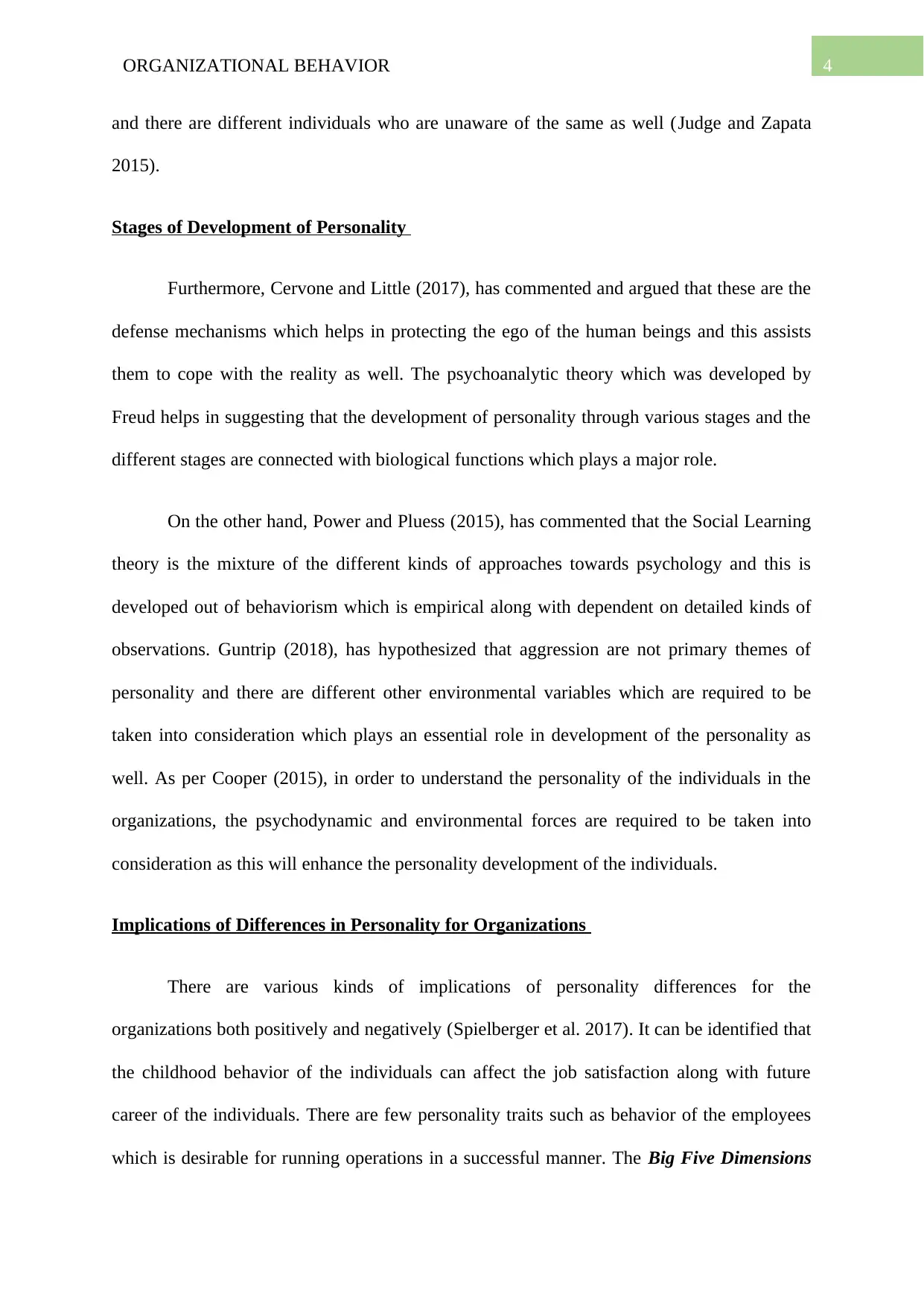
4ORGANIZATIONAL BEHAVIOR
and there are different individuals who are unaware of the same as well (Judge and Zapata
2015).
Stages of Development of Personality
Furthermore, Cervone and Little (2017), has commented and argued that these are the
defense mechanisms which helps in protecting the ego of the human beings and this assists
them to cope with the reality as well. The psychoanalytic theory which was developed by
Freud helps in suggesting that the development of personality through various stages and the
different stages are connected with biological functions which plays a major role.
On the other hand, Power and Pluess (2015), has commented that the Social Learning
theory is the mixture of the different kinds of approaches towards psychology and this is
developed out of behaviorism which is empirical along with dependent on detailed kinds of
observations. Guntrip (2018), has hypothesized that aggression are not primary themes of
personality and there are different other environmental variables which are required to be
taken into consideration which plays an essential role in development of the personality as
well. As per Cooper (2015), in order to understand the personality of the individuals in the
organizations, the psychodynamic and environmental forces are required to be taken into
consideration as this will enhance the personality development of the individuals.
Implications of Differences in Personality for Organizations
There are various kinds of implications of personality differences for the
organizations both positively and negatively (Spielberger et al. 2017). It can be identified that
the childhood behavior of the individuals can affect the job satisfaction along with future
career of the individuals. There are few personality traits such as behavior of the employees
which is desirable for running operations in a successful manner. The Big Five Dimensions
and there are different individuals who are unaware of the same as well (Judge and Zapata
2015).
Stages of Development of Personality
Furthermore, Cervone and Little (2017), has commented and argued that these are the
defense mechanisms which helps in protecting the ego of the human beings and this assists
them to cope with the reality as well. The psychoanalytic theory which was developed by
Freud helps in suggesting that the development of personality through various stages and the
different stages are connected with biological functions which plays a major role.
On the other hand, Power and Pluess (2015), has commented that the Social Learning
theory is the mixture of the different kinds of approaches towards psychology and this is
developed out of behaviorism which is empirical along with dependent on detailed kinds of
observations. Guntrip (2018), has hypothesized that aggression are not primary themes of
personality and there are different other environmental variables which are required to be
taken into consideration which plays an essential role in development of the personality as
well. As per Cooper (2015), in order to understand the personality of the individuals in the
organizations, the psychodynamic and environmental forces are required to be taken into
consideration as this will enhance the personality development of the individuals.
Implications of Differences in Personality for Organizations
There are various kinds of implications of personality differences for the
organizations both positively and negatively (Spielberger et al. 2017). It can be identified that
the childhood behavior of the individuals can affect the job satisfaction along with future
career of the individuals. There are few personality traits such as behavior of the employees
which is desirable for running operations in a successful manner. The Big Five Dimensions
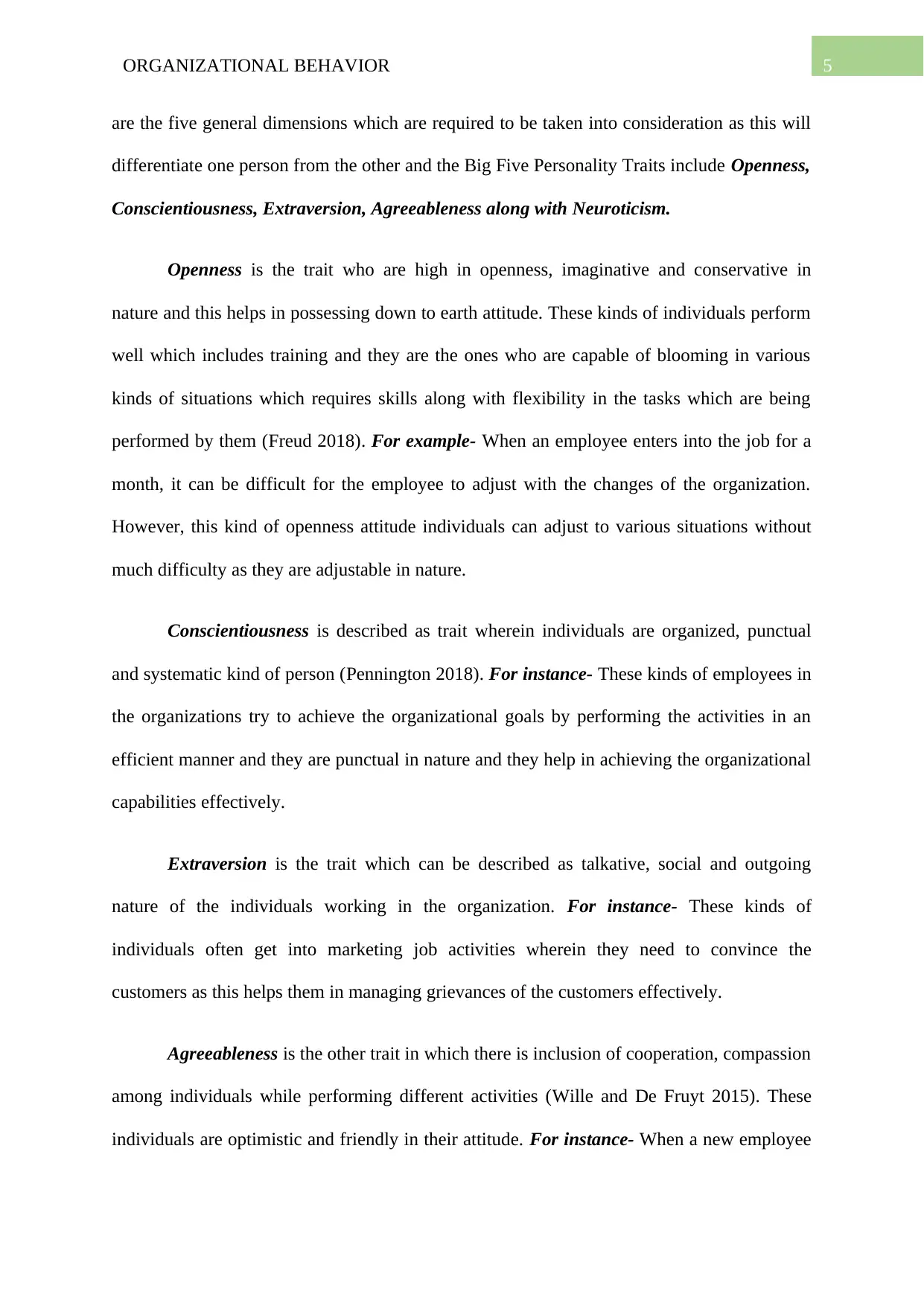
5ORGANIZATIONAL BEHAVIOR
are the five general dimensions which are required to be taken into consideration as this will
differentiate one person from the other and the Big Five Personality Traits include Openness,
Conscientiousness, Extraversion, Agreeableness along with Neuroticism.
Openness is the trait who are high in openness, imaginative and conservative in
nature and this helps in possessing down to earth attitude. These kinds of individuals perform
well which includes training and they are the ones who are capable of blooming in various
kinds of situations which requires skills along with flexibility in the tasks which are being
performed by them (Freud 2018). For example- When an employee enters into the job for a
month, it can be difficult for the employee to adjust with the changes of the organization.
However, this kind of openness attitude individuals can adjust to various situations without
much difficulty as they are adjustable in nature.
Conscientiousness is described as trait wherein individuals are organized, punctual
and systematic kind of person (Pennington 2018). For instance- These kinds of employees in
the organizations try to achieve the organizational goals by performing the activities in an
efficient manner and they are punctual in nature and they help in achieving the organizational
capabilities effectively.
Extraversion is the trait which can be described as talkative, social and outgoing
nature of the individuals working in the organization. For instance- These kinds of
individuals often get into marketing job activities wherein they need to convince the
customers as this helps them in managing grievances of the customers effectively.
Agreeableness is the other trait in which there is inclusion of cooperation, compassion
among individuals while performing different activities (Wille and De Fruyt 2015). These
individuals are optimistic and friendly in their attitude. For instance- When a new employee
are the five general dimensions which are required to be taken into consideration as this will
differentiate one person from the other and the Big Five Personality Traits include Openness,
Conscientiousness, Extraversion, Agreeableness along with Neuroticism.
Openness is the trait who are high in openness, imaginative and conservative in
nature and this helps in possessing down to earth attitude. These kinds of individuals perform
well which includes training and they are the ones who are capable of blooming in various
kinds of situations which requires skills along with flexibility in the tasks which are being
performed by them (Freud 2018). For example- When an employee enters into the job for a
month, it can be difficult for the employee to adjust with the changes of the organization.
However, this kind of openness attitude individuals can adjust to various situations without
much difficulty as they are adjustable in nature.
Conscientiousness is described as trait wherein individuals are organized, punctual
and systematic kind of person (Pennington 2018). For instance- These kinds of employees in
the organizations try to achieve the organizational goals by performing the activities in an
efficient manner and they are punctual in nature and they help in achieving the organizational
capabilities effectively.
Extraversion is the trait which can be described as talkative, social and outgoing
nature of the individuals working in the organization. For instance- These kinds of
individuals often get into marketing job activities wherein they need to convince the
customers as this helps them in managing grievances of the customers effectively.
Agreeableness is the other trait in which there is inclusion of cooperation, compassion
among individuals while performing different activities (Wille and De Fruyt 2015). These
individuals are optimistic and friendly in their attitude. For instance- When a new employee
⊘ This is a preview!⊘
Do you want full access?
Subscribe today to unlock all pages.

Trusted by 1+ million students worldwide
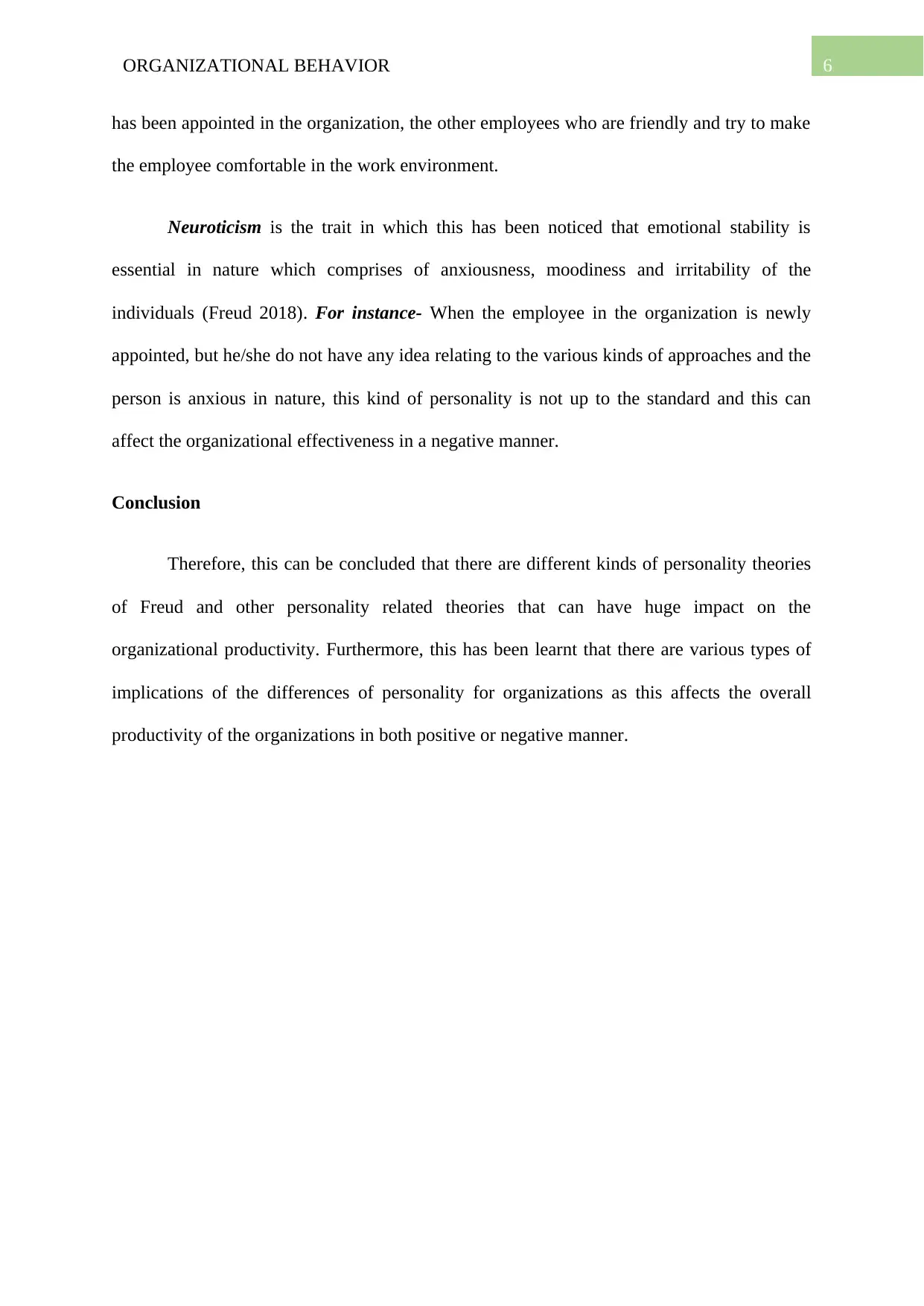
6ORGANIZATIONAL BEHAVIOR
has been appointed in the organization, the other employees who are friendly and try to make
the employee comfortable in the work environment.
Neuroticism is the trait in which this has been noticed that emotional stability is
essential in nature which comprises of anxiousness, moodiness and irritability of the
individuals (Freud 2018). For instance- When the employee in the organization is newly
appointed, but he/she do not have any idea relating to the various kinds of approaches and the
person is anxious in nature, this kind of personality is not up to the standard and this can
affect the organizational effectiveness in a negative manner.
Conclusion
Therefore, this can be concluded that there are different kinds of personality theories
of Freud and other personality related theories that can have huge impact on the
organizational productivity. Furthermore, this has been learnt that there are various types of
implications of the differences of personality for organizations as this affects the overall
productivity of the organizations in both positive or negative manner.
has been appointed in the organization, the other employees who are friendly and try to make
the employee comfortable in the work environment.
Neuroticism is the trait in which this has been noticed that emotional stability is
essential in nature which comprises of anxiousness, moodiness and irritability of the
individuals (Freud 2018). For instance- When the employee in the organization is newly
appointed, but he/she do not have any idea relating to the various kinds of approaches and the
person is anxious in nature, this kind of personality is not up to the standard and this can
affect the organizational effectiveness in a negative manner.
Conclusion
Therefore, this can be concluded that there are different kinds of personality theories
of Freud and other personality related theories that can have huge impact on the
organizational productivity. Furthermore, this has been learnt that there are various types of
implications of the differences of personality for organizations as this affects the overall
productivity of the organizations in both positive or negative manner.
Paraphrase This Document
Need a fresh take? Get an instant paraphrase of this document with our AI Paraphraser
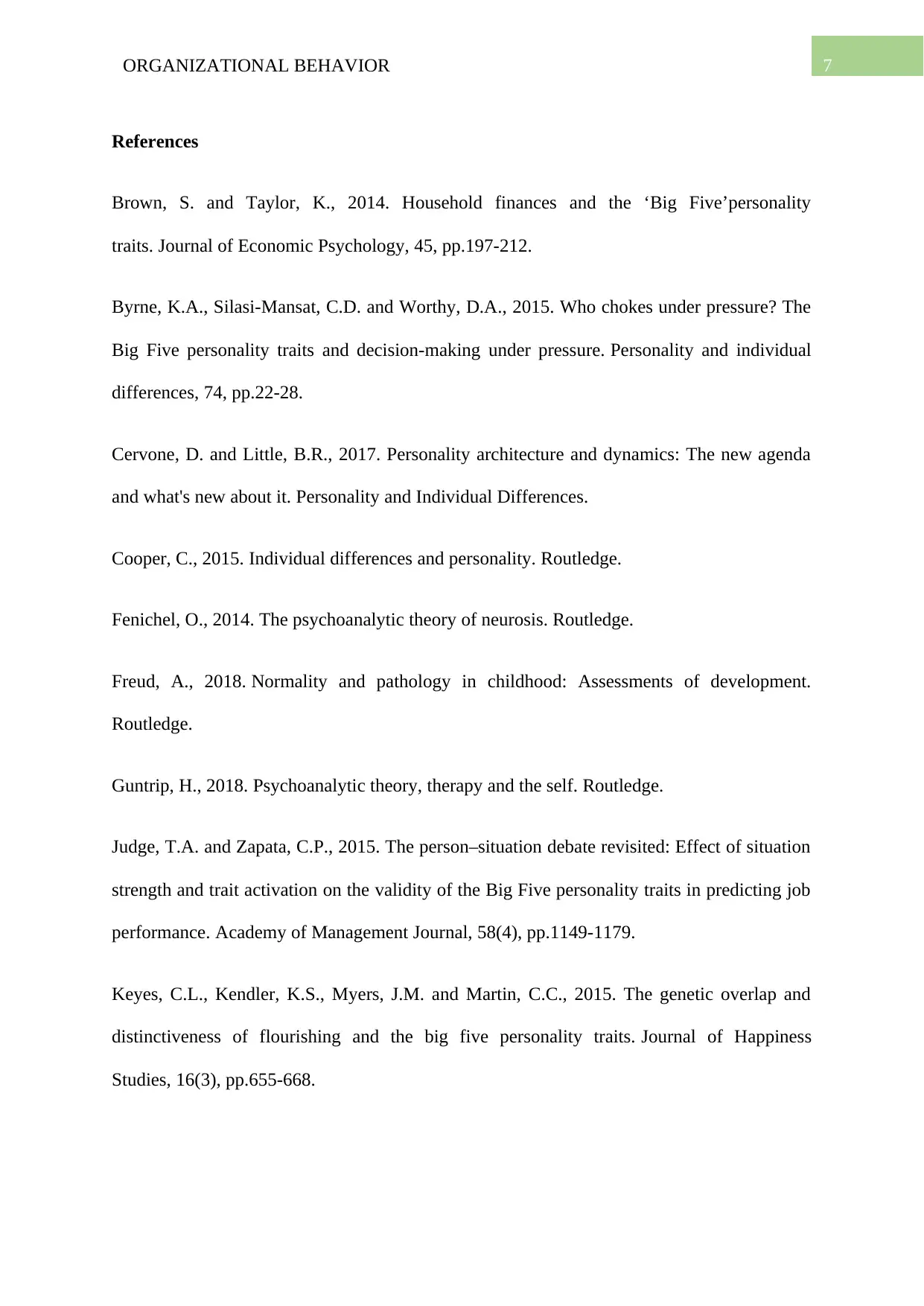
7ORGANIZATIONAL BEHAVIOR
References
Brown, S. and Taylor, K., 2014. Household finances and the ‘Big Five’personality
traits. Journal of Economic Psychology, 45, pp.197-212.
Byrne, K.A., Silasi-Mansat, C.D. and Worthy, D.A., 2015. Who chokes under pressure? The
Big Five personality traits and decision-making under pressure. Personality and individual
differences, 74, pp.22-28.
Cervone, D. and Little, B.R., 2017. Personality architecture and dynamics: The new agenda
and what's new about it. Personality and Individual Differences.
Cooper, C., 2015. Individual differences and personality. Routledge.
Fenichel, O., 2014. The psychoanalytic theory of neurosis. Routledge.
Freud, A., 2018. Normality and pathology in childhood: Assessments of development.
Routledge.
Guntrip, H., 2018. Psychoanalytic theory, therapy and the self. Routledge.
Judge, T.A. and Zapata, C.P., 2015. The person–situation debate revisited: Effect of situation
strength and trait activation on the validity of the Big Five personality traits in predicting job
performance. Academy of Management Journal, 58(4), pp.1149-1179.
Keyes, C.L., Kendler, K.S., Myers, J.M. and Martin, C.C., 2015. The genetic overlap and
distinctiveness of flourishing and the big five personality traits. Journal of Happiness
Studies, 16(3), pp.655-668.
References
Brown, S. and Taylor, K., 2014. Household finances and the ‘Big Five’personality
traits. Journal of Economic Psychology, 45, pp.197-212.
Byrne, K.A., Silasi-Mansat, C.D. and Worthy, D.A., 2015. Who chokes under pressure? The
Big Five personality traits and decision-making under pressure. Personality and individual
differences, 74, pp.22-28.
Cervone, D. and Little, B.R., 2017. Personality architecture and dynamics: The new agenda
and what's new about it. Personality and Individual Differences.
Cooper, C., 2015. Individual differences and personality. Routledge.
Fenichel, O., 2014. The psychoanalytic theory of neurosis. Routledge.
Freud, A., 2018. Normality and pathology in childhood: Assessments of development.
Routledge.
Guntrip, H., 2018. Psychoanalytic theory, therapy and the self. Routledge.
Judge, T.A. and Zapata, C.P., 2015. The person–situation debate revisited: Effect of situation
strength and trait activation on the validity of the Big Five personality traits in predicting job
performance. Academy of Management Journal, 58(4), pp.1149-1179.
Keyes, C.L., Kendler, K.S., Myers, J.M. and Martin, C.C., 2015. The genetic overlap and
distinctiveness of flourishing and the big five personality traits. Journal of Happiness
Studies, 16(3), pp.655-668.
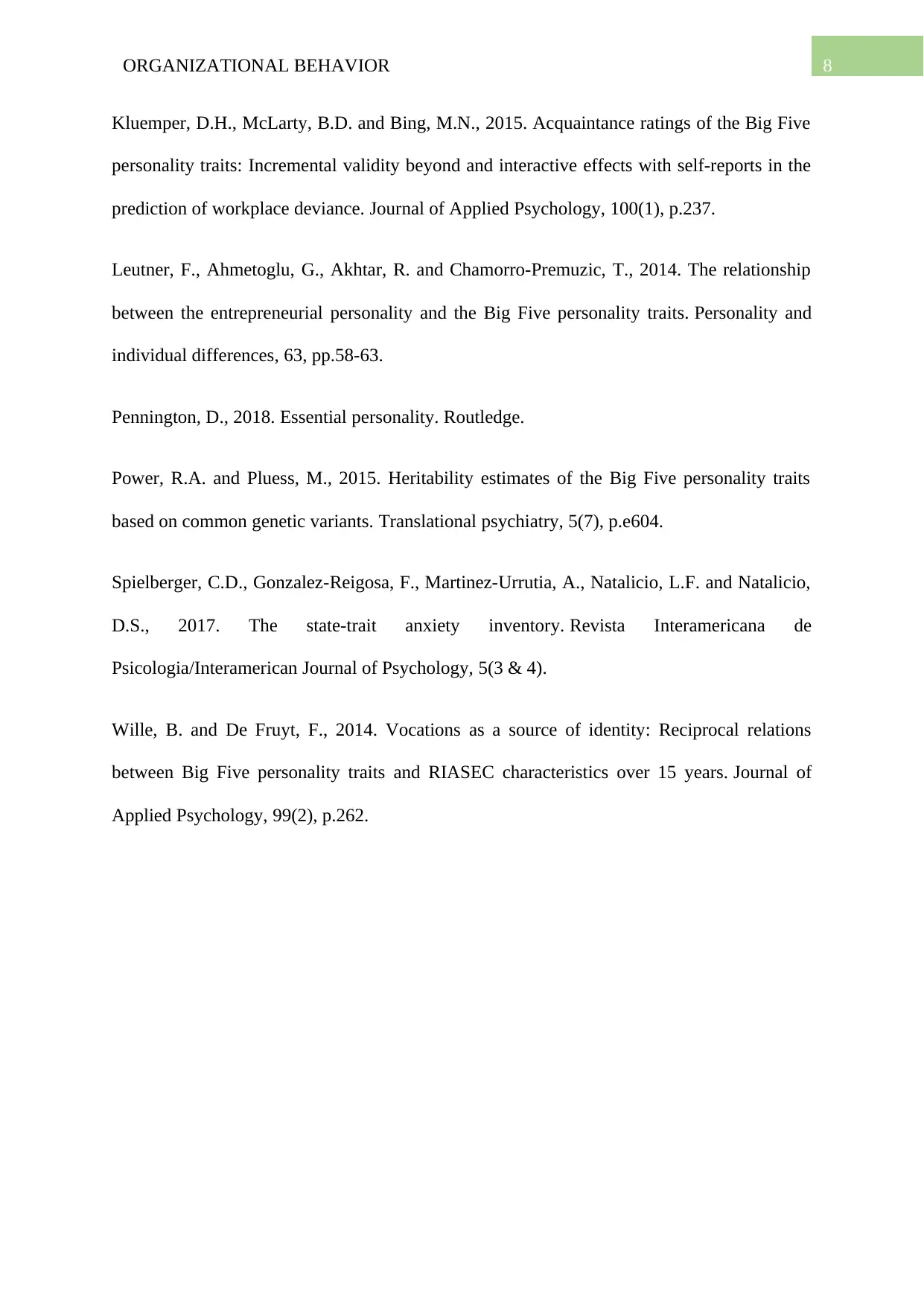
8ORGANIZATIONAL BEHAVIOR
Kluemper, D.H., McLarty, B.D. and Bing, M.N., 2015. Acquaintance ratings of the Big Five
personality traits: Incremental validity beyond and interactive effects with self-reports in the
prediction of workplace deviance. Journal of Applied Psychology, 100(1), p.237.
Leutner, F., Ahmetoglu, G., Akhtar, R. and Chamorro-Premuzic, T., 2014. The relationship
between the entrepreneurial personality and the Big Five personality traits. Personality and
individual differences, 63, pp.58-63.
Pennington, D., 2018. Essential personality. Routledge.
Power, R.A. and Pluess, M., 2015. Heritability estimates of the Big Five personality traits
based on common genetic variants. Translational psychiatry, 5(7), p.e604.
Spielberger, C.D., Gonzalez-Reigosa, F., Martinez-Urrutia, A., Natalicio, L.F. and Natalicio,
D.S., 2017. The state-trait anxiety inventory. Revista Interamericana de
Psicologia/Interamerican Journal of Psychology, 5(3 & 4).
Wille, B. and De Fruyt, F., 2014. Vocations as a source of identity: Reciprocal relations
between Big Five personality traits and RIASEC characteristics over 15 years. Journal of
Applied Psychology, 99(2), p.262.
Kluemper, D.H., McLarty, B.D. and Bing, M.N., 2015. Acquaintance ratings of the Big Five
personality traits: Incremental validity beyond and interactive effects with self-reports in the
prediction of workplace deviance. Journal of Applied Psychology, 100(1), p.237.
Leutner, F., Ahmetoglu, G., Akhtar, R. and Chamorro-Premuzic, T., 2014. The relationship
between the entrepreneurial personality and the Big Five personality traits. Personality and
individual differences, 63, pp.58-63.
Pennington, D., 2018. Essential personality. Routledge.
Power, R.A. and Pluess, M., 2015. Heritability estimates of the Big Five personality traits
based on common genetic variants. Translational psychiatry, 5(7), p.e604.
Spielberger, C.D., Gonzalez-Reigosa, F., Martinez-Urrutia, A., Natalicio, L.F. and Natalicio,
D.S., 2017. The state-trait anxiety inventory. Revista Interamericana de
Psicologia/Interamerican Journal of Psychology, 5(3 & 4).
Wille, B. and De Fruyt, F., 2014. Vocations as a source of identity: Reciprocal relations
between Big Five personality traits and RIASEC characteristics over 15 years. Journal of
Applied Psychology, 99(2), p.262.
⊘ This is a preview!⊘
Do you want full access?
Subscribe today to unlock all pages.

Trusted by 1+ million students worldwide
1 out of 9
Related Documents
Your All-in-One AI-Powered Toolkit for Academic Success.
+13062052269
info@desklib.com
Available 24*7 on WhatsApp / Email
![[object Object]](/_next/static/media/star-bottom.7253800d.svg)
Unlock your academic potential
Copyright © 2020–2026 A2Z Services. All Rights Reserved. Developed and managed by ZUCOL.





